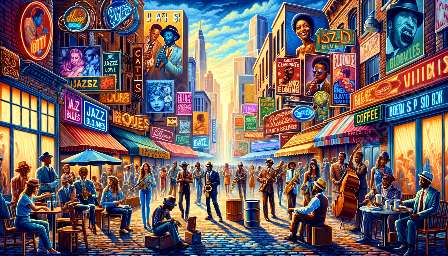The evolution of jazz and blues over the centuries has been profoundly impacted by globalization, shaping contemporary music scenes in unique ways. Let's explore the effects of globalization on the rich history of jazz and blues, and how it has influenced their modern landscape.
Evolution of Jazz and Blues over the Centuries
Jazz and blues are two distinct musical genres with roots deeply embedded in African American culture and history. The evolution of these genres spans several decades, starting from their origins in the late 19th and early 20th centuries.
Jazz: Originally emerging in the African American communities of New Orleans, jazz gained popularity through its fusion of African and European music traditions. Over time, it evolved into various subgenres, from swing and bebop to fusion and avant-garde, reflecting the changing social and cultural landscapes of America.
Blues: Rooted in the hardships and struggles faced by African Americans, the blues originated in the Mississippi Delta and gradually spread across the United States. Its expressive style and emotive lyrics resonated with audiences, leading to the rise of influential blues musicians and the development of diverse regional styles.
Globalization and Its Influence on Jazz and Blues
Globalization, characterized by increased interconnectedness and the exchange of ideas, products, and cultural practices, has had a significant impact on the evolution of jazz and blues. As these genres spread beyond their country of origin, they encountered diverse musical traditions and absorbed new influences, shaping their contemporary forms.
Impact on Jazz: Jazz became a global phenomenon as it reached new audiences around the world, leading to cross-cultural collaborations and the incorporation of diverse musical elements. The fusion of jazz with international styles, such as Latin jazz, Afro-Cuban jazz, and world music, resulted in innovative and eclectic compositions, reflecting the global exchange of musical concepts and techniques.
Globalization enabled jazz musicians to engage with musicians from diverse cultural backgrounds, fostering a spirit of cross-cultural creativity and collaboration.
Impact on Blues: The globalization of blues music facilitated its diffusion across continents, as international artists embraced and reinterpreted its raw emotional expression. Blues-rock fusion, exemplified by British rock bands in the 1960s, introduced a new chapter in the global dissemination of blues, influencing subsequent generations of musicians and inspiring cross-genre experimentation.
Contemporary Jazz and Blues Music Scenes in the Globalized Era
In the contemporary music landscape, the effects of globalization are evident in the vibrant jazz and blues scenes, characterized by a rich tapestry of cultural influences and global connectivity. From international jazz festivals and cross-genre collaborations to the preservation of traditional blues roots and the emergence of new subgenres, globalization continues to shape the trajectory of jazz and blues.
Contemporary jazz and blues artists draw inspiration from diverse musical traditions, enriching their compositions with global flavors while honoring the authenticity of their respective genres. The digital age has further amplified the reach of jazz and blues music, allowing artists to connect with global audiences and share their creations across borders.
Conclusion
The effects of globalization on contemporary jazz and blues music scenes have been profound, enriching these genres with global perspectives while preserving their core identities. As jazz and blues continue to evolve in an interconnected world, their enduring legacy and global appeal serve as a testament to the enduring power of music to transcend cultural boundaries and unite diverse communities.






























